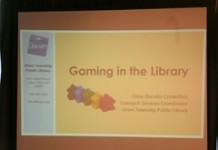The Library of the Future will allow you to set up your own Book-Of-The-Week (or Month, or Day) Club; you will be able to say: ’email me a book like this one every week until I ask you to stop.’ You can choose the criteria yourself (all the PG Wodehouse books, in chronological order) or let the system do it for you (books like The Man in Lower Ten). With ‘fuzzy’ criteria like this, your own system will then feed back to the library whether you actually read that week’s book, so it can modify its decision rules for next time.
In fact your own computer/PDA/reading device system will be an integral part of the LOTF. It will keep track of what you read and when, who you shared it with, what you thought of it and where to find it again if necessary. It will also have ‘rules’ for dealing with incoming and finished books, rather like the message rules that currently exist for incoming and outgoing email.
Here’s the expanded version:
It’s four am. You’re asleep, but your computer is working. A new eBook — Carry on Jeeves — arrives through your broadband connection from the Library of the Future. Six weeks ago you asked it to find English humour from the early 1900s and send you one eBook a week. So far it’s sent you books by Jerome K. Jerome, Christopher Morley, and PG Wodehouse. There were also some humorous articles by AA Milne in Punch ; these weren’t long enough individually to meet your criteria, so it combined them into an eBook for you. It knows you like AA Milne because it has a complete record of all the eBooks you’ve read over the past three years. It didn’t send you Three Men in a Boat, though that’s high on its popularity rating; it knows you read it eighteen months ago. E.F. Benson would have been a candidate author, but it knows that you tried one of his books a year ago and gave up on it after two days. It will try another one a little later.
The book arrives at your PC and triggers your personal bookcase application. That logs the arrival of the book and adds metadata about the book to its records — length, author, genre, title, publication date, reviews, voices for reading aloud, and details about what people who enjoyed this book also read. Later that information, updated with your own response, will be sent back to the library. You can browse the bookshelf at any time, and find out what you read and when, what you thought of it, and information about other similar books you might enjoy. Any annotations or general comments that you have made on the books are stored here too, along with your instructions to the library: ‘send a copy to Auntie Sue’; ‘don’t want to read any more like this for a year’. After two years of operation, the number of books in the case is approaching a thousand.
One of your instructions for these weekly books is to transfer them to your PDA. That’s connected by wireless, so Carry on Jeeves is transmitted to the device, which is currently at your bedside, doubling as an alarm clock. It wakes up silently, receives the transmission and activates its own bookshelf software. The electronic bookshelf knows it that you’ve finished with last week’s book — Three Men on the Bummel — along with how long it took to read, whether you completed it and any annotations, comments, recommendations and instructions that you made. There’s another book on the shelf that you ordered specially, Albanian History Since 1987. You’ve only read one chapter of it; but you’ve indicated that you’re finished with that too, so these books are deleted from your PDA and information about your reading of them is copied back to the PC.
Morning comes. You activate the PDA and start up the bookshelf software. It informs you of the changes that were made during the night; you have, of course, the option to reverse them. Seeing this reminds you of another book you wanted to look up, so you make a request to the Library of the Future. It’s not urgent so you don’t send it off straight away but leave it to be dealt with during the next 4 am session.
On your way to and from work you have Carry on Jeeves read to you. Your PDA chooses voices for the characters based on markup instructions in the text. Bertie Wooster is based on Hugh Grant. At lunchtime you read off the screen. When you get home you activate your PC. Its bookcase program asks the PDA how far you got, and whether you want to go on reading from the PC screen where you left off on the PDA. All the other books in your bookcase are, of course, available too. The PC goes on reading the book aloud to you during dinner, using the same voices as the PDA. You choose a different voice for one of the characters, and your choice of voices is recorded in the metadata for this book to be transmitted back to the LOTF.
You finish reading the book on your PDA, in bed. The bookshelf program upgrades PG Wodehouse in your ratings. It also notes that you now don’t have a book for tomorrow. Next week’s selection will have to be brought forward. At 4 am, the process starts again….
Author’s note: All this, of course, assumes that books continue to be a separate concept rather than being merged with the mass of other electronic information becoming available through the web. I think that in time the notion of a separate ‘book’ will come to seem archaic and we — or rather, our agents — will routinely collect our reading material from a variety of sources, compiling it as we need it. I have hinted at this in the comment on AA Milne. It will of course require even more sophisticated software. But the essence of what I have described is achievable.
— Jon Jermey
Editor’s note: If you have ideas about what the Library of the Future will be like, please submit them. Photos must be yours or be authorized by the photographer, whom we’ll happily identify. Send your vision to Roger Sperberg, first initial lastname at gmail.































What stimulates me most about your idea is how it recognizes that we have a computer as part of this system, and that it can be integrated into the process of identifying useful books for us. “Expert systems” aren’t all that complicated and could readily be applied in this circumstance.
Nice ideas!
One major influence for this is the CDDB music database, which I don’t think has had the recognition it deserves. You put a CD into your computer and it reads the first few bytes, automatically looks up a humongous database, and feeds the artist, title, track names and genre straight back to the media player of your choice. Better still, if the CD’s not there you can add its details yourself, making it available for everyone else in the world. And it’s all free. Who could have dreamed something like this would ever work?
wow, jon jermey is writing “library of the future” pieces.
what a pleasant surprise! jon jermey is a smart cookie…
and what better demonstration than his post right here!
collaborative filtering — which is _not_ “an expert system”,
but merely a “dumb” set of algorithms crunching the data,
and the difference is very important — will indeed become
the tool that magically pulls our own personal _needles_
from an ever-increasing _haystack_ of cyberspace material.
considering that content overload will be a huge problem
— it already is — this solution will be quite welcome indeed.
welcome on-board, jon! :+)
-bowerbird